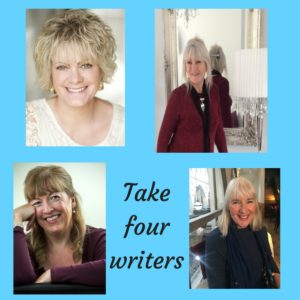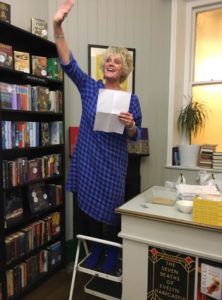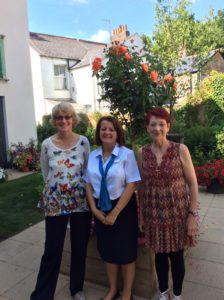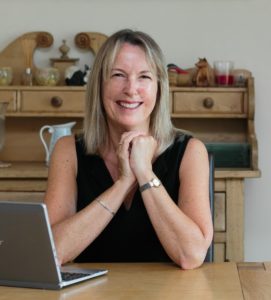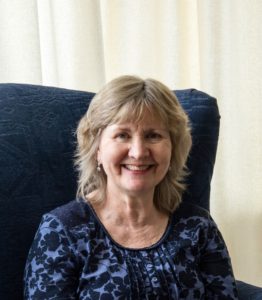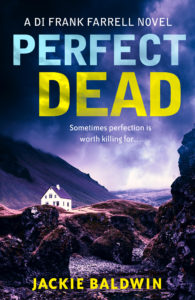
What was the first writing advice you were ever given?
If I think back to when I started to seriously consider writing full-length stories, the first piece of advice I recall was ‘just keep putting the words on the page’. After all, you can’t polish and edit a blank page, can you?
At the time, I’d only ever completed short stories, mostly co-written, for online communities. A solo writing project was a challenge in itself, but I didn’t really think of it as ‘writing a novel’ because of the serial nature of posting online.
It was the encouragement (and above advice) from those communities that helped me to get started, and it’s down to their on-going support and feedback that I managed to keep going, no matter what life threw at me. I just kept putting one word after the other, until eventually I’d finished telling the story I wanted to share.
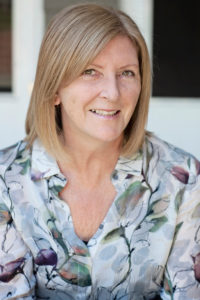
Photo copyright is Adrea Scheidler Photography
What was the most recent writing advice you were given?
I follow a lot of writing blogs on Twitter, and many of them have wonderful snippets of advice, one of the most practical of which in recent months was about removing redundant words from your manuscript.
I discovered there were plenty of lists out there, once I’d put ‘redundant words in your novel’ into Google, and soon I was working my way through my extremely long manuscript and culling them (thank you, Word, for the Search and Replace function). In the end, nearly 10,000 redundant words sailed off into the blue yonder; not one of them was missed!
It turns out, however, that my biggest overuse of anything is not a specific word, but a punctuation mark. It was pointed out to me at a writing retreat last year that I need to ‘kill the exclamation mark.’ When I looked into it, I was appalled by how often I used them. I did, indeed, have a bit of a fetish going on. Hopefully, I’ve managed to keep them to a minimum in this blog post!
What is the piece of advice you’d most like to pass on?
There are variations on these words, but it boils down “don’t wait for your boat to come in; row out to meet it”.
It’s something I wish I’d taken on-board (if you’ll excuse the pun) earlier in my life. It can, of course, relate to all aspects of life, but with regard to my writing, it translates into this: Don’t let time slip away from you.
I’d wanted to write all my life, but always I made excuses: “no time, children to look after, piles of marking to get through, got to work late, too tired”. Even when the children were teenagers and didn’t need the same level of attention, even when I had an unexpected year of not having to work full time, always I seemed to have an excuse for actually sitting down and doing it.
I was 50 before the realisation struck that I needed to heed this advice – when it almost felt too late. I’d had a recent run-in with cancer, which led to a couple of rather unpleasant years, and as my milestone birthday approached, I started to re-evaluate my life. If I didn’t get my act together and produce a book sometime soon, perhaps I would never fulfil my lifelong dream?
It would be another year (2013) before I finally took the plunge into publishing my first novel. The story had been seven years in the making, for all the aforementioned reasons, but I did it.
It had still been a challenge. I was working full time, long hours, and any writing time was limited to weekends and holidays (thankfully I have a very patient and supportive husband, who would hoover around my chair at weekends as I sat at the computer, or read the paper in a pub when we were on holiday as I scribbled away at scenes in my notebook).
In more recent years, having moved to Switzerland and no longer having a day job, I have had the time to write, but still I procrastinate. My New Year’s Resolution this year was to treat my writing like a job, not a hobby, and I’m improving, but there’s a way to go yet.
So please don’t do as I do, do as I say: don’t let the time slip away from you!
Cassandra has published two historical romances and has co-written and published a contemporary cosy mystery/romance. She is currently working on a series of contemporary feel-good romances set in Cornwall. She loves traveling, reading, cats and dry wine and splits her time between Switzerland, where she lives with her husband, and England, where she lives with her characters.
https://cassandragrafton.com
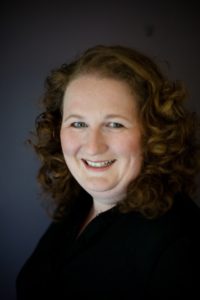 I was talking to a young person who wanted to get into publishing, and I suggested they try and get a job in a bookshop. There is no better training ground for understanding the book industry today and for meeting readers. Readers should be at the heart of everything publishers do, but they can get side-lined!
I was talking to a young person who wanted to get into publishing, and I suggested they try and get a job in a bookshop. There is no better training ground for understanding the book industry today and for meeting readers. Readers should be at the heart of everything publishers do, but they can get side-lined!

